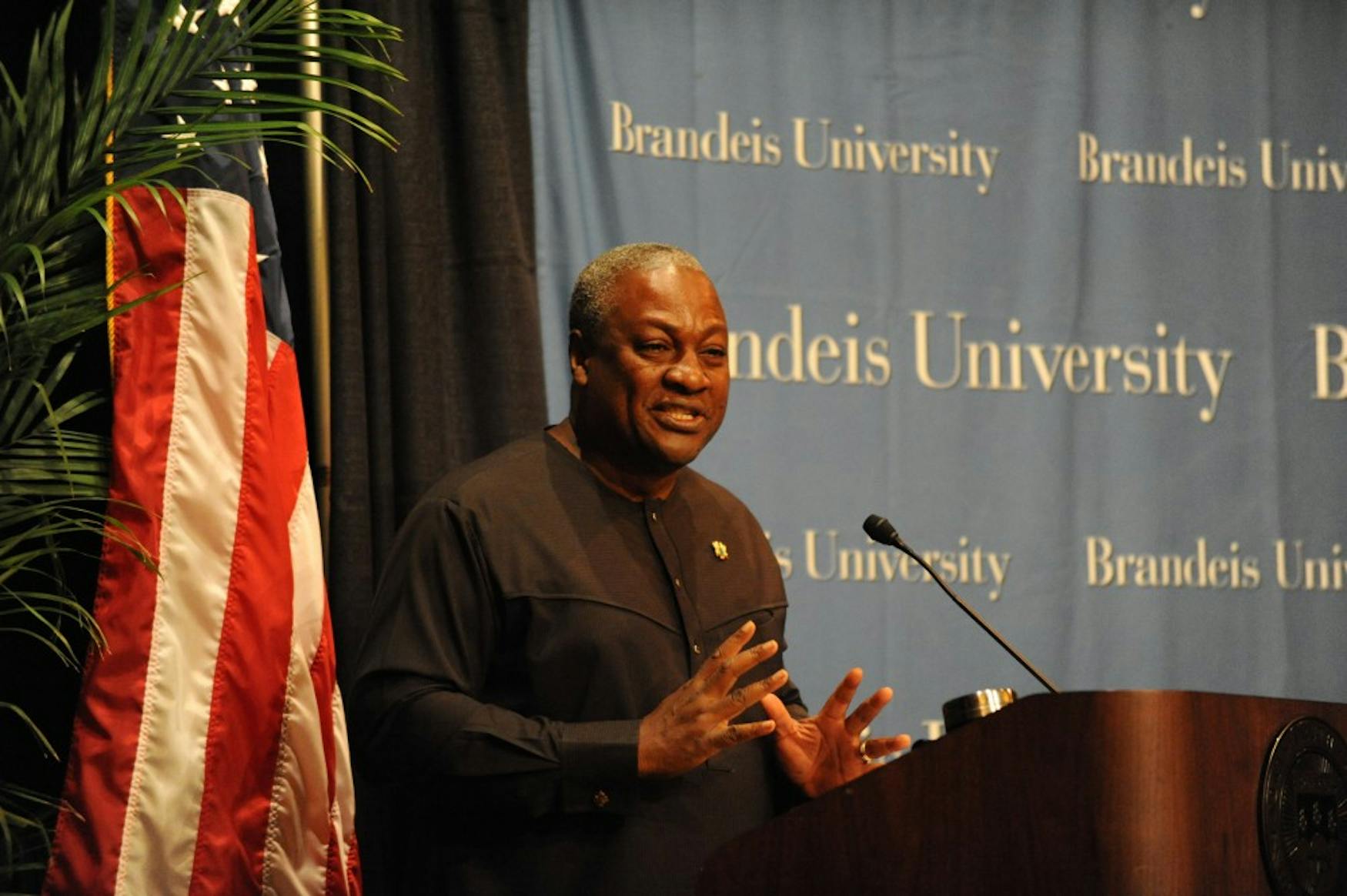President of Ghana speaks on “The African Promise”
President of Ghana John Dramani Mahama gave a speech on Monday in the Shapiro Campus Center Theater. After speaking at the United Nations General Assembly on Sept. 25, he was invited by Ghanaian Prof. Joseph Assan (Heller) to come speak at Brandeis about “The African Promise.”
In an interview with the Justice, Prof. Joan Dassin (Heller), director of the Master of Arts Program in Sustainable International Development at the Heller School for Social Policy and Management, noted that Mahama was also eager to come because Brandeis has unique ties to Ghana.
In the interview, she described Brandeis’ partnership with the University of Development Studies in Ghana and how Brandeis sends students in the SID to Ghana for experiential learning. Dassin also mentioned Brandeis’ Learning Across Borders program, which engages students from Ghana’s University of Developmental studies, Brandeis and Beijing Normal University in China in a dialogue about what development means.
After a group of Brandeis students opened the event by performing the Ghanaian gahu dance, Mahama took the stage.
He began his lecture by asserting, “The promise of Africa is its people.” He said that Africa’s biggest developmental impediment is its distorted perception in eyes of the Western world.
“The problem that has faced Africa and its people has been a problem of perception. Or perhaps better said, a problem of misconception,” he stated, defining that problem as “the misrepresentations and misperceptions of Africa as a primitive and monolithic country, rather than a continent, diverse in every way has not only entered, but is actively defining modernity today.”
He shared a personal anecdote, which University President Frederick Lawrence later proclaimed was one of his favorites, about his niece who was instant messaging online with a boy her age from the United States. The boy asked where she was from and she responded that she was from Ghana. The boy then asked where that was, and when she told him it was in Africa, he replied, “Wow! You guys have computers in Africa? ” She typed back: “No, we’re sitting by the river in our village sending smoke signals that are being magically transmitted as words onto your screen.”
Mahama then backtracked to explain the conditions that triggered Africa’s political and economic decay over the past few centuries.
“The economic wealth and strength of Africa preceded the era of colonialism,” he stated. He listed a number of very affluent African kingdoms that stood at the forefront of global trade prior to the 19th century, and asserted that colonialism in the 1800s caused the political and economic devastation in Africa. “Division is a primary tool of conquest,” he said. “There is not one border that does not divide something more than just the land.”
He noted that even after countries gained their independence, “their former colonizers did not just leave, but they left with a vengeance, destroying everything in their wake.” He said that this marked the beginning of the “Lost Decades,” a period of cruel dictatorships, corruption, poverty and civil war.
Mahama then went on to emphasize the enormous strides Africa had made within just the past few years. “In the past few years, Africa has found itself in a position that many, given the continent’s history over the last two centuries, imagined impossible,” he said. He noted that six of Africa’s countries have been repeatedly named among the top 10 fastest-growing economies in the world. He described how the Economic Community of West African States, the regional body of which he serves as chairman, has worked to promote the free movement of people, goods and services across the West African region.
He pointed out that Africa currently has more democratic countries and fair elections than ever before. He also described initiatives of the African Union to “create a platform for Africans to speak with one voice and to work towards the establishment of a free-trade area throughout the entire continent.”
Mahama concluded his speech with the metaphor of “Africa Rising.” “Africa Rising,” he explained, “is like the phoenix that rises out of its ashes to once again soar.” Mahama referred to the people of Africa as “collectively that phoenix, rising out of the ashes of enslavement, rising out of the ashes of colonization, rising out of the ashes of dictatorship, civil war and economic ruin.”
The floor was then opened up for questions from the audience.
In response to a question about economic infrastructure reform in Ghana, Mahama explained that in the late 1970s and 1980s, Ghana experienced negative economic growth. He said that since 1992 when the country began the climb back into democracy and constitutional government, “Ghana has not looked back.” He explained that Ghana’s democratic infrastructure has not only benefitted the country immensely in its political sphere but also sparked national economic growth and made Ghana a more appealing trade partner in the eyes of other nations. Mahama called Ghana’s visible growth the “democracy dividend.”
Mahama then described Ghana’s model of political and economic “decentralization.” This model includes the division of Ghana into several district assemblies, where eight percent of national revenue is distributed for the districts’ autonomous use. The idea behind the model was that government money could be funneled directly to local causes where it was most needed. The decentralization plan also includes a changeover from a government monopoly of capital enterprise to a promotion of private investment and entrepreneurship within the private sector, opening up more opportunities for individuals to participate in Ghana’s economy.
Mahama attributed the Ghanaian unemployment crisis to a growing population, of which nearly 60 percent is under 35 years old. He said that while Ghana has focused great efforts on education, there exists a misalignment between university education and current job market demands—which call for more technical skills. In response to this challenge, Mahama launched the Youth Enterprise Support Initiative on Aug. 12, 2014.
This initiative encourages entrepreneurs to submit business proposals online. A panel selects the most interesting proposals and trains the conceivers of those proposals, helping them to establish their businesses and later providing them to younger entrepreneurs as mentors.
Mahama also addressed the Ebola crisis, primarily in relation to its negative effect on the African social sphere. He described how the dignity of both the living and the dead has been diminished because of the reduction in interpersonal physical contact and undignified medical burials of diseased individuals.
He said that Ghana is taking precautions against the spread of Ebola by conducting thorough screenings at airports and publicizing information about the virus. He emphasized the enormous benefit of foreign aid from the United Nations, as well as the United States and other countries. “If the response continues as it’s going, I believe that within the next nine to 12 months we should be able to turn it around and be successful in containing it,” he said.




Please note All comments are eligible for publication in The Justice.